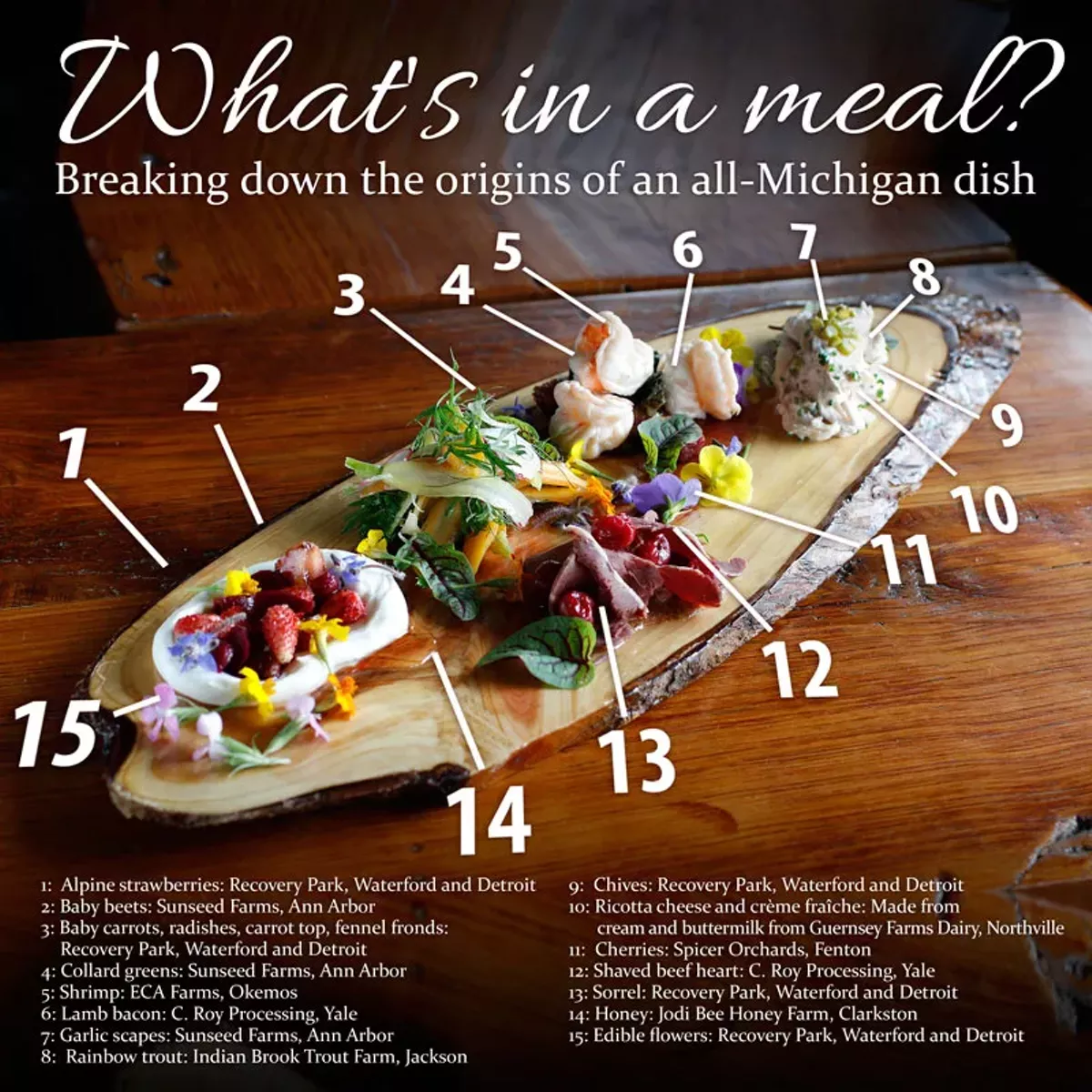The milk makers
The buttermilk and cream Rigato uses to make crème fraiche and ricotta comes from Guernsey Farms Dairy, located a couple miles down the road from Twelve Oaks Mall in Northville. When it was founded in 1940, it was out in the country. Now it's surrounded by sprawl. What visitors will find is a modern building in a suburb. Despite the name, there are no farms at Guernsey. But the milk comes from all around. Guernsey purchases its milk through a co-op run by the National Farmers Organization, and the milk comes from about seven small farmers in areas including Lansing, St. Johns, and Byron.
Manager Colleen Ortman laughs and tells us, "There aren't any cows here. But it's a very large building and all the processes are done here. We have ginormous freezers and coolers. Also we have a nice quaint little restaurant that's old-fashioned and family oriented. We have an ice cream parlor with 48 to 50 flavors to choose from."
Ortman says, "We have a longstanding relationship with the farmers we deal with. There aren't really many left in Michigan. There are no growth hormones in any of our milk. It is all RBST-free. That's important and that's something we've done for many years now. "
Like C. Roy, Guernsey is a kind of throwback to an earlier time. Co-owner Marty McGuire, one of the founder's sons, says the farmers Guernsey works with are traditional family farms that treat animals as more than milk-producing machines. He says, "Their cows are like part of their family."
McGuire adds, "I guess you would call us a craft dairy. We try to do the best we can and work with all the old formulas my dad created back when he went to Michigan Agriculture College and wrote up the formulas. We still use the basic formulas he created back then."
The fruit growers
The cherries in Rigato's dish come from Spicer Orchards, a family orchard owned and operated by Alan and Wanda Spicer since the late 1960s. It sprawls over the four corners of Clyde and Heartland roads in Fenton, encompassing almost 400 acres, producing strawberries, raspberries, peaches, plums, blueberries, pears, apples, pumpkins, and cherries. The U-pick orchard is close enough to the city to have ready customers, and far away enough to still be firmly planted in the country.
Crop manager Will Cartwright, 43, has worked for the Spicers since he was a teenager. He's known Rigato since before the chef opened the Root. Cartwright says Spicer provides much more than the Rainier cherries Rigato transforms into Maraschinos. Cartwright says, "When James places an order, we get it fresh-picked that morning and we get it up to him. I mean, he'll prepare a dish with fruit that's only maybe been picked for a few hours."
Spicer sets a high standard for its agricultural practices, even if, again, it isn't a certified organic enterprise. The farm uses integrated pest management, utilizing insect traps and trained scouts to look for problems before they start, responding with reduced-risk, consumer-friendly chemicals as a last resort.
Cartwright says, "We'll only spray if there's going to be an economic loss. We can bear some damage, but if it gets beyond the point to where we're going to lose too much, then we have to put a control on, which, to be honest with you, is very little. ... The fruit very rarely gets sprayed — only if there's disease or pest pressure that was provided by Mother Nature that we have to control. But we're real good and careful about that."
And even if losses loom, they seldom affect more than one crop. The wide range of crops at Spicer Orchards helps keep those losses to a minimum, and a bumper crop can tilt that balance.
That said, Cartwright doesn't seem like the kind of guy to dwell on dollars and cents. Asked how business is, he sounds like somebody from another century: "There's three families that work on the farm. We all work hard to make sure business is always growing, and we're trying to do the right thing. Business is good, so I think that, in a way, reflects our work and pride in our business."
The greenhouse farmer
Just off Scott Lake Road in Waterford, yards away from the whizzing traffic of the road, there's a kind of rural retreat. Next to a decaying barn sits a complex of greenhouses, where whirring fans circulate air above about 50,000 plants. The rear of the property abuts Waterford Oaks County Park, providing a horizon of low, rolling, forested hills. It's the kind of place that can feel much farther out in the country than it really is.
The greenhouses are the temporary home of Recovery Park, a small farm furnishing produce for such restaurants as Chartreuse, the Root, Selden Standard, Republic, Gold Cash Gold, Bacco Ristorante, and Townhouse. This list of hip clients is no coincidence: The enterprise is run by Michelle Lutz, the kind of grower who'll sit down and chat with a chef over a seed catalog before planting.
In fact, right now she's harvesting produce for a local chef, using a pair of needlenose shears to gather pods from a bed of wasabi arugula that has gone to seed. She offers a seed pod for tasting, warning, "This will light your mouth off. I tested them out with a chef I worked with and he's in love with them. That is one thing that is really neat about what's happening with our food culture. All of a sudden, the Detroit area is lit up with chefs that are willing to use the unusual."
It's welcome news to Lutz, who caters to a culinary trade by growing lesser-known heirloom edibles. She says, "Chefs may not use a high volume of produce, but the stuff they care for is really specialty. That's where the price point comes in. Maybe you don't have to grow hundreds of pounds of something. You can have a smaller amount and do a pretty fine job, financially."
In fact, Recovery Park was just picked up by one of the largest produce distributors in Michigan, a family-owned operation that serves more than 400 restaurants in the state. And Lutz doesn't grow just produce for chefs, but crops of edible flowers as well: The blossoms include nasturtium, dianthus, Mexican marigold, and viola. But she warns, "Just because they are edible doesn't always mean they'll taste good," before adding with a smile, "I do try to stick with edibles that I think actually taste good."
The enterprise has moved around a bit. Its ongoing intention is to be an urban farm helping build careers for people with barriers to employment. Last year, it was at 2600 E. Grand Blvd., where Lutz built raised beds and put up a 4,000-square-foot high-tunnel greenhouse in a parking lot. The pilot project was successful, and Lutz needed to expand. While a 110-acre land deal with the city is pending, Lutz is working out of Waterford. She says, "We've been growing here since the beginning of January and we've actually sold products in February. It's been a nice little space for us." Lutz plans to move the business back to Detroit in October, and to personally move to the city as well.
And Detroit in 2016 may be the perfect time and place for Lutz and her business, with the rising value of local, fresh, sustainably grown food. Lutz doesn't mince words, saying, "If you would've tried this 10 years ago, you would've been shit on. I remember struggling so hard growing organic food. ... It was painful how long it took for stores, for anyone to catch on, but I knew it would.
"Agriculture has always been a great thing for Michigan. It's the second-leading industry. But we don't treat it like one. We are still too comfortable with watching our food get brought in."







